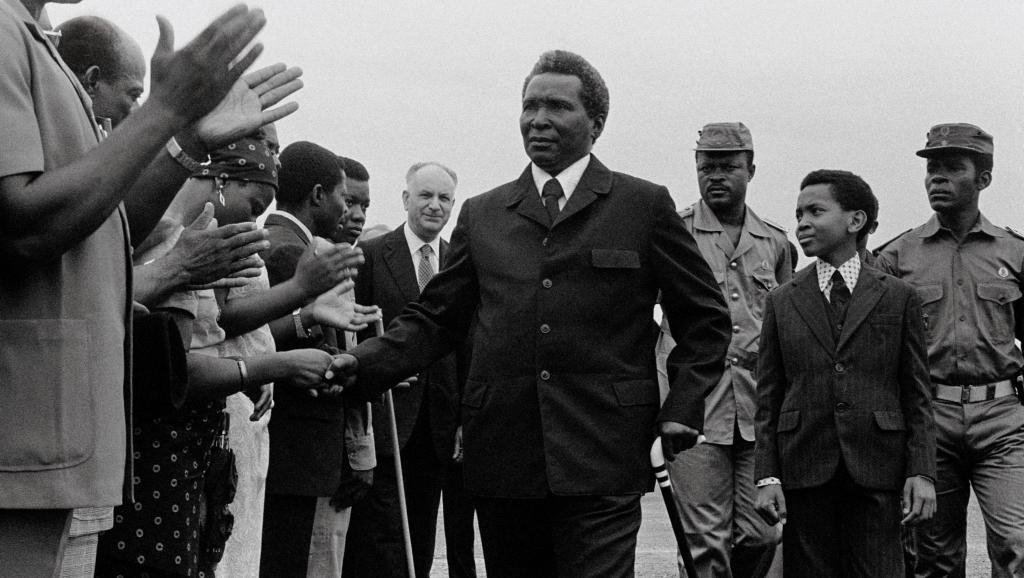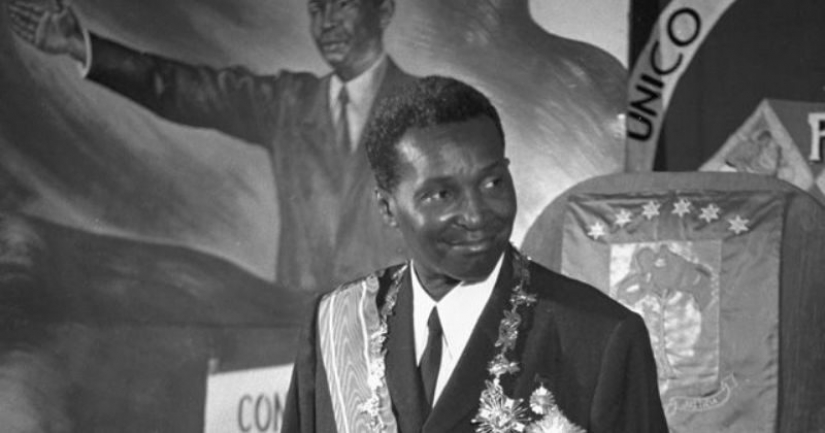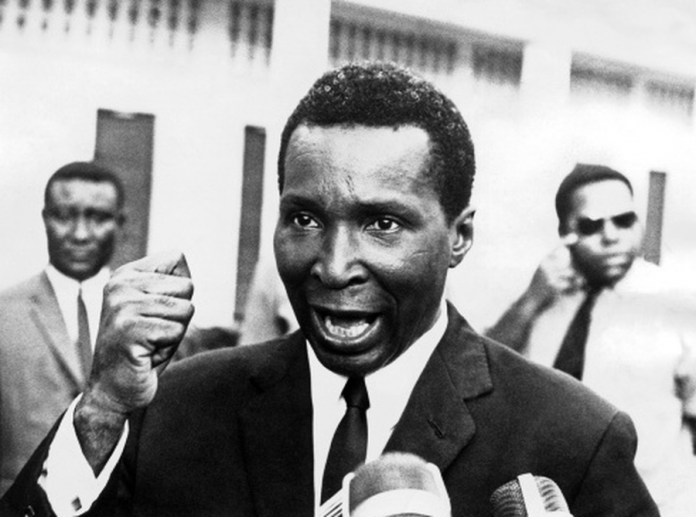Equatorial Guinea – one of the richest countries in Africa. At one time, it was the richest, thanks to the oil resources found in its territory. Its first president, Francisco Macias, a hardened dictator, held power with his fist tightly clenched for 11 years, until 1979, when he was overthrown. But how brutal and how much does one have to torture a nation to make it rebel?
He was born in 1924 in colonial Guinea, which was part of the Spanish colony. It was the only Spanish colonial state in sub-Saharan Africa. The dictator is said to have witnessed the death of his father when he was nine years old. He was beaten to death by a Spanish colonial policeman. The day after the incident, his mother committed suicide out of grief. It can be assumed that these shocking events early in his life had a direct impact on the then young Nguema. Perhaps that is why the man became such a cold-blooded individual who sought power at any cost, perhaps always through violence.
How did a man of such brutal character get elected as President? During his campaign, he manipulated the masses and told them what they wanted to hear, and he was not afraid of harsh and rhetorical nationalistic views. That is one of the reasons why he won against another candidate.
He has only completed primary school. He could read with syllables, but not write. The man even crossed himself three times in the civil service exam, which led to a low sense of self-esteem that turned into hatred of intellectuals.
Politically, he became known for his ardent support for the Spanish colonists. He made his way into local government at the fourth attempt, launching his political career. Nguema Mongomo was mayor of the town during the period of Spanish settlement.
Later, he was a member of the local parliament. Before the country declared independence in 1968, Nguema was elected President in the only democratic two-round election in the country’s history. The man immediately began to physically eliminate or kill his opponents.
Bonifacio Ondo Edu, a former Prime Minister who also ran for the presidency, was starved and died in prison just after Nguema became President. Another version is that Edu fled the country after the unsuccessful elections and later committed suicide. Finally, a third speculation is that Ondo planned a rebellion against Nguema after the failed elections, and that Bonifacio was executed when this was revealed.
During this period, other former high-ranking officials of the country were officially recognised as having committed suicide, although many believe they suffered the same fate as Edu. All opponents are known to have been cracked down on and their assets confiscated, sold or otherwise appropriated and exploited. But such things require a repressive structure. A national militia was formed under the name ‘Youth in March With Macias’.

This structure was the dictator’s main weapon against the people. It was they who carried out all the whims of the ruler and are responsible for the mass extermination of civilians, torture, looting and the burning of entire villages.
Attacking objects such as plantations was not frowned upon. One example is the destruction of a cocoa plantation set up and worked by Nigerian migrants. The workers there went on strike and demanded higher wages, as the taxes were enormous. In addition, these personal thugs also beat up Nigerian diplomats when they arrived in the Guinea capital.
Perhaps the most notorious case of mass murder took place on Christmas Eve, 1969. 150 political opponents were lined up in a stadium and shot. Cold-bloodedly, the officers who carried out this crime were wearing Santa Claus outfits and the sound system was playing the song ‘Those Were The Days My Friend’ by Mary Hopkin. That same evening, the 26 victims were ordered to dig a trench in which they were later buried up to their necks and left to their fate. More precisely, to be eaten by red ants.
Francisco was extremely jealous and ordered the murder of all his mistress’s former admirers. In addition, all the men of his personal sympathies were killed.
It is estimated that around 80 000 people were killed during Nguema’s reign. This is an insanely high figure, given that the country had a population of around 600 000 people at the time. Nguema’s human rights abuses resulted in the emigration of more than a third of the country’s population to other countries.
The dictator ordered the dismantling of the railway to prevent people from leaving the country. All the instruments of oppression (military, personal guards) were under the control of Nguema or the people around him.
However, absolute power was not yet officially in the hands of a man, so he went even further. On 7 May 1971, a new declaration was issued which partially revoked part of the 1968 constitution and gave Nguema unlimited power: areas that had previously been the responsibility of ministers, the government or other municipal institutions became the direct presidential responsibility. In the same year, another regulation was issued: threatening the President or the government was punishable by death. Insulting the President or his cabinet of ministers was punishable with 30 years in prison.
A year later, another bold step was taken. All the country’s former parties were merged into a single party, The United National Party. Of course, it was led by Macias. In the country’s Parliament, the man had personally held 20 of the 60 seats and half of the posts in the government.
This was followed by the implicit law: the President remains in office for life. The government was the victim of family scandals, with many ministers being trusted confidants from the same village as the President. Nguema appointed his nephew as head of the National Guard.
The government also took over the economy. Of course, the President had no idea how the economy worked, nor how to strengthen the currency. There was not even a system for the distribution of funds so that all the tax money could be distributed efficiently. Nguema managed to assassinate the head of the country’s central bank and declare that only the President of the country could reliably maintain the gold and currency reserves and then he took it all for himself and kept the assets, first in his villa, in his bedroom, but later he found this to be too unreliable so he took seven suitcases of money back to his home village. Since the money was buried under the ground, some of it rotted.

Macias proclaimed himself the genius of science, education and culture, thus launching a war against all intellectuals. He claimed that the educated social class was polluting the political climate of the country with foreign cultures. Almost all educated people were killed or exiled. Private education was declared ” destructive ” and was banned. The word “intellectual” became a complete ban.
It seems silly, but wearing glasses has been banned because, according to the President, this is how intellectuals try to pretend to be smarter than everyone else.
“I’m not a fool myself, even though I’m from the peasantry, but they put on glasses to show off to working people.”
Over time, Francisco has become overwhelmed by his power and has started to make strange choices. He used his own indigenous knowledge of shamanism to frighten the population in order to further justify his rule. This was followed by even more absurd actions, such as burning boats for fishing and booby-trapping roads to prevent people from fleeing. Finally, economically, the country stagnated: 90% of public services, such as electricity, the post office and transport came to a complete stop. The cocoa and fishing industries, which had sustained the economy up to that point, also crashed. As if all this were not enough, the President also banned western medicines.
Of course, Macias himself could not govern without electricity, so when the country’s electricity economy began to collapse, he declared that electricity was not necessary and cut off everyone’s power, using generators to get electricity in his palace.
You would think it couldn’t get any stranger, but the dictator banned the Catholic Church and declared himself a god. He did not use alcohol, but abused psychotropic drugs very often. Some believed that the dictator’s behavior was due to his heavy and frequent use of marijuana.
Eventually, he needed a doctor, but it turned out that there were no doctors left in the country. His relatives then called in a doctor from Cameroon, who was shot dead after examining the dictator. Some people in the President’s inner circle have speculated that he may have become a psychopath as a result of childhood trauma. Other psychological conditions were also said to have influenced his actions.

Fortunately, everything comes to an end. And so it is for the dictator of Guinea. Many dictators have been famous for their bizarre or extravagant decisions, but one thing is clear: you can afford to do a lot of things when you are in absolute power until the military is satisfied. This is where Nguema made the critical mistake of not paying the promised wages to the military.
On 3 August 1979, he was forcefully overthrown by his own nephew, Teodoro Obiang Nguema Mbasogo, who was the head of the country’s National Guard. The whole process has been described as an execution.
Teodoro felt obliged to rebel because in 1979 there was an incident in which 6 soldiers of the National Guard went to the capital of Mongolmo and demanded the wages that were rightfully theirs for the work they had done, however impossible it might be. Six soldiers were killed. This was a kind of signal to the nephew that the uncle had ‘got too much in’ and that it was time to take over. The best defense is offense.
Mbasogo and part of the army managed to catch Nguema on 18 August in the country’s jungle with an empty suitcase containing money. He is believed to have eaten about 2 million dollars during his two weeks in hiding, and burnt some of it to keep himself warm. Other sources claim that the President was arrested in his home village.
The fury of the National Guard was justified. Over the course of his 11 years in office, the President owed them between $20,000 and $50,000. In a special court martial, Macias was accused of genocide, mass murder, theft of public funds, human rights violations and stealing.
The court sentenced Nguema to death and on the 29th of September of the same year he was executed. His nephew took over the presidency and has been in charge ever since.




